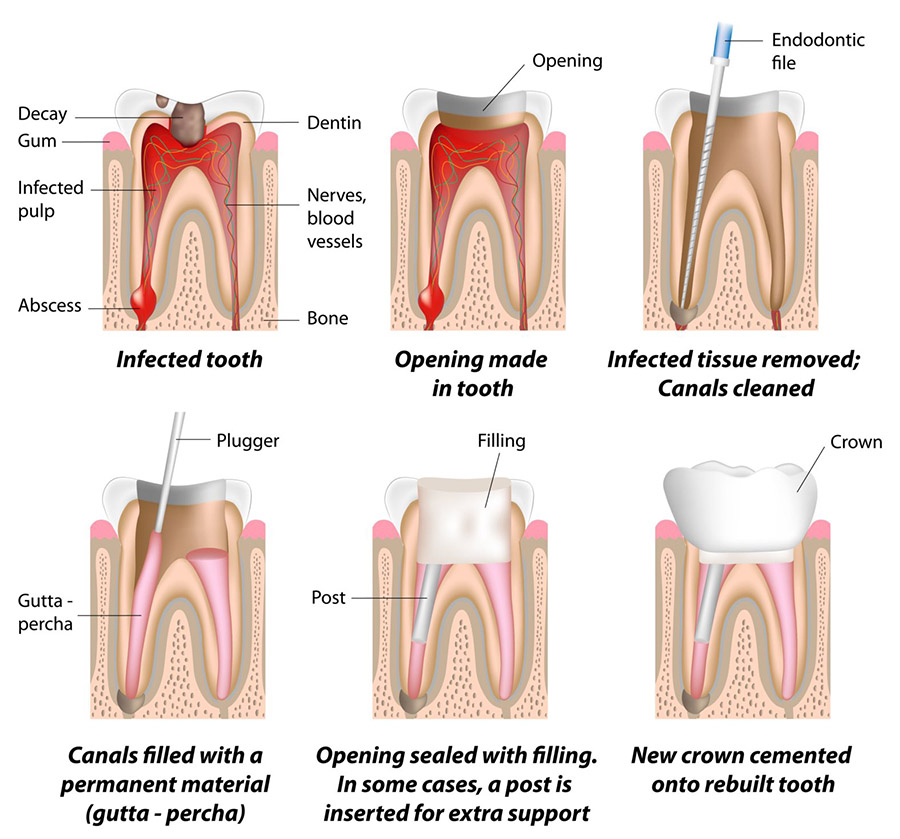What is a Root Canal?
Root canal treatment is the procedure that removes the dead, infected or inflamed nerves from a tooth. It is one of the best ways to save your teeth and is typically done in 3 to 4 stages, and involves the placement of medication within the tooth, cleaning and shaping of the canals. Occasionally we are able to complete it in one visit, in the absence of large infection or severe symptoms. It is completed once the area where the nerves used to be is filled with a special filling material to prevent future bacterial growth.
Signs you might need Root Canal Treatment
 The most obvious sign is a consistent dull throbbing (toothache) in a tooth. The gum around the tooth may be swollen or an abscess can be seen. Cold and hot drinks can cause severe, long lasting pain. Often, the pain will wake you up at night and consistent doses of pain relief medication is required to keep it under control. Although sometimes it is possible for a severely infected tooth to have no pain because the nerve in the tooth has been dead for a while.
The most obvious sign is a consistent dull throbbing (toothache) in a tooth. The gum around the tooth may be swollen or an abscess can be seen. Cold and hot drinks can cause severe, long lasting pain. Often, the pain will wake you up at night and consistent doses of pain relief medication is required to keep it under control. Although sometimes it is possible for a severely infected tooth to have no pain because the nerve in the tooth has been dead for a while.
DO NOT IGNORE the symptoms. Any pain you might be having in your tooth could be the start of a major problem. In most cases, if the problem is caught early, a simple fix is all you need. However, if you leave the pain for long enough, the nerve of the tooth could get infected and might die as a result. This will result in a toothache or abscess and once this happens, your treatment options are limited and are more complicated. The longer an infection sits around the tooth, the harder it is to treat and the lower the chance of success of root canal treatment.
Early treatment is key!
What happens when I get a root canal?
For most patients, 3 to 4 appointments are made with the following steps:
- Stage 1 – Open & Drain (Extirpation)
- The first appointment is where we open up the tooth and assess suitability for a root canal. There are some instances where we open up the tooth and there is some reason why a root canal is not possible (e.g. large crack into roots).
- Stage 2 – Chemo-Mechanical Preparation
- If we continue the root canal then the appointments involve us removing the dead, infected or inflamed nerves of the tooth, the cleaning and shaping of the internal canals of the tooth and placement of more medication inside the canals.
- Stage 3 – Obturation
- The final stage is the placement of a root filling to prevent further bacterial growth in the canal.
- Stage 4 – Dental Crown or Restoration
- Generally, a dental crown is needed to permanently restore the tooth back to function. Crowns are generally required in most cases to seal the access cavity of the root canal and to provide long term strength and resistance to tooth fracture.

Are Root Canals painful?
In most cases, there is very little or no pain. If there is a slight discomfort, this is usually controlled very well with minor pain relief medication. In some rare cases, if the infection is left for too long and the nerve of the tooth is extremely inflamed, there might be some pain during the first visit. This is why when you have pain, you must not leave it! See your dentist immediately!
How long do root canals last?
Generally, studies have shown root canals to last around 7-10 years but there are many root canals that last much longer. If you are healthy, have good oral hygiene (ie. you brush and floss well), get regular dental maintenance (at the dentist) and have restored the tooth properly with a dental crown, you can expect them to last a lot longer. The main cause of root canals failing is because of tooth decay around the tooth which means bacteria return to the root canal.
What are the alternatives to Root Canal Treatment?
Alternatives to root canals include no treatment (with worsening of symptoms) or tooth extraction.
Are there any complications with Root Canals?
As with any treatment, there are always possible risks and complications. Several possible complications include:
- Fracture or separation of flexible, thin files used to clean and shape the canals.
- Tooth fracture or tooth cracking.
- Canals there are calcified and difficult to find.
- Missed or untreated accessory (additional) canals
- Potential for perforation of the tooth when we are searching for a canal.
- Specialist referral may be required mid-way through treatment if any of the above occur.
Sometimes complications can’t be detected until we start the root canal. However, that said, some patients despite all of this, still have complications with their root canal work. The prognosis is much better when the root canal is started in a timely manner, prior to infection.
Interested in Dental Root Canal Treatment?
Contact us now on (03) 8899 6331 or check out our other services here.
Book Online
Need help with your dental payments?
We have a variety of Payment Plans available – giving you the flexibility of paying for your Root Canal Treatment later.
Payment PlansFrequently Asked Questions
- How much do Root Canals cost?
- Root canals are complex dental procedures involving advanced equipment and multiple visits. The costs greatly vary between teeth due to the time required, complexity of the root system and number of roots. They can cost anywhere between $1,000 to $3,000 for an average tooth. The Dental crown is a separate cost to this.
- Do you need to to refer me to a specialist to do my Root Treatment?
- We do most Root Canals here at Dental at Keys. Occasionally due to the complex anatomical nature of your tooth, you may need to be referred to an Endodontist.
- Do I need sleep dentistry for Root Canals?
- It’s up to you! If you are anxious about dental treatment, sedation options like sleep dentistry might be a good option for you. If not, most of our procedures are done under local anaesthetic at our dental clinic.
- Can I get my Root treatment done in one visit?
- In some cases, we are able to do all stage of a root canal in one long visit. However, this is generally not always done due to certain medical risks such as large infections or complex tooth root systems

